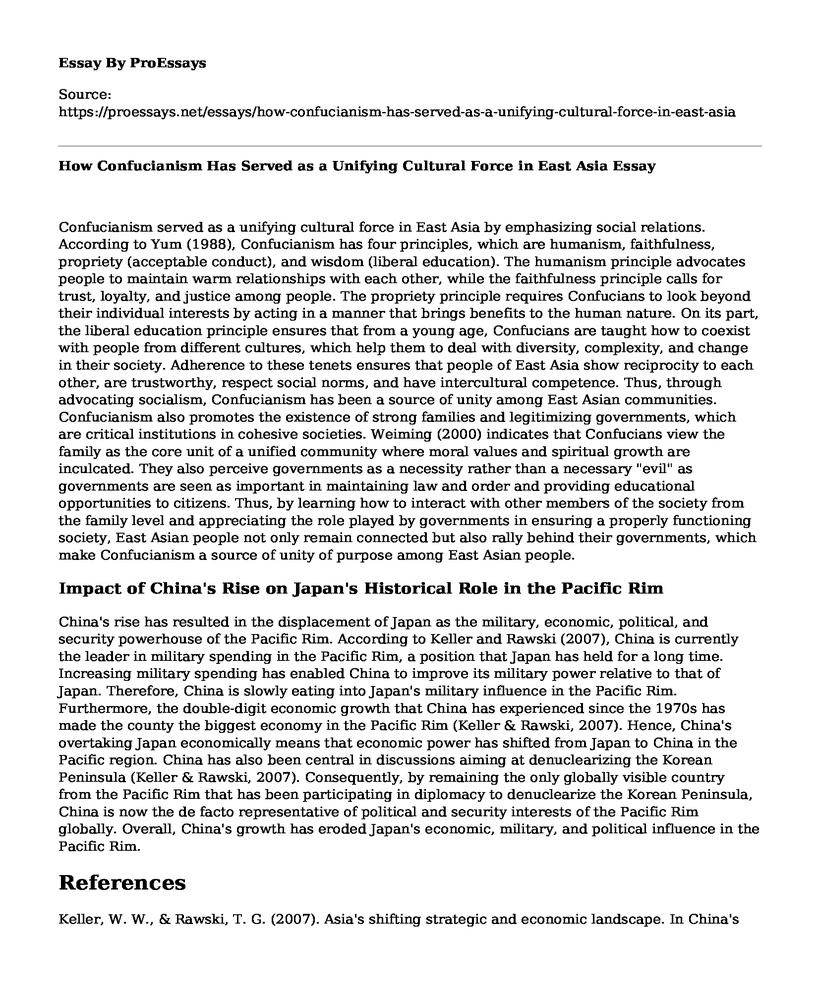Confucianism served as a unifying cultural force in East Asia by emphasizing social relations. According to Yum (1988), Confucianism has four principles, which are humanism, faithfulness, propriety (acceptable conduct), and wisdom (liberal education). The humanism principle advocates people to maintain warm relationships with each other, while the faithfulness principle calls for trust, loyalty, and justice among people. The propriety principle requires Confucians to look beyond their individual interests by acting in a manner that brings benefits to the human nature. On its part, the liberal education principle ensures that from a young age, Confucians are taught how to coexist with people from different cultures, which help them to deal with diversity, complexity, and change in their society. Adherence to these tenets ensures that people of East Asia show reciprocity to each other, are trustworthy, respect social norms, and have intercultural competence. Thus, through advocating socialism, Confucianism has been a source of unity among East Asian communities. Confucianism also promotes the existence of strong families and legitimizing governments, which are critical institutions in cohesive societies. Weiming (2000) indicates that Confucians view the family as the core unit of a unified community where moral values and spiritual growth are inculcated. They also perceive governments as a necessity rather than a necessary "evil" as governments are seen as important in maintaining law and order and providing educational opportunities to citizens. Thus, by learning how to interact with other members of the society from the family level and appreciating the role played by governments in ensuring a properly functioning society, East Asian people not only remain connected but also rally behind their governments, which make Confucianism a source of unity of purpose among East Asian people.
Impact of China's Rise on Japan's Historical Role in the Pacific Rim
China's rise has resulted in the displacement of Japan as the military, economic, political, and security powerhouse of the Pacific Rim. According to Keller and Rawski (2007), China is currently the leader in military spending in the Pacific Rim, a position that Japan has held for a long time. Increasing military spending has enabled China to improve its military power relative to that of Japan. Therefore, China is slowly eating into Japan's military influence in the Pacific Rim. Furthermore, the double-digit economic growth that China has experienced since the 1970s has made the county the biggest economy in the Pacific Rim (Keller & Rawski, 2007). Hence, China's overtaking Japan economically means that economic power has shifted from Japan to China in the Pacific region. China has also been central in discussions aiming at denuclearizing the Korean Peninsula (Keller & Rawski, 2007). Consequently, by remaining the only globally visible country from the Pacific Rim that has been participating in diplomacy to denuclearize the Korean Peninsula, China is now the de facto representative of political and security interests of the Pacific Rim globally. Overall, China's growth has eroded Japan's economic, military, and political influence in the Pacific Rim.
References
Keller, W. W., & Rawski, T. G. (2007). Asia's shifting strategic and economic landscape. In China's rise and the balance of influence in Asia (1st ed., pp. 1-24). Retrieved from https://www.ridgway.pitt.edu/Portals/1/pdfs/Publications/KellerRawskiASSEL.pdf
Weiming, T. (2000). Implications of the rise of "Confucian" East Asia. Daedalus, 129(1), 195-218.
Yum, J. O. (1988). The impact of Confucianism on interpersonal relationships and communication patterns in East Asia. Communication Monographs, 55(4), 374-388. doi:10.1080/03637758809376178
Cite this page
How Confucianism Has Served as a Unifying Cultural Force in East Asia. (2022, Feb 18). Retrieved from https://proessays.net/essays/how-confucianism-has-served-as-a-unifying-cultural-force-in-east-asia
If you are the original author of this essay and no longer wish to have it published on the ProEssays website, please click below to request its removal:
- A Letter to Bartolome de las Casas in Response to His Book
- Jihad Concept and Five Pillars of Islam
- Islamic Women and Their Rights to Inheritance Essay
- The Central Beliefs, Customs, Traditions Practices and Contributors of Buddhism
- The Pagan Influence on Christianity Essay Example
- Essay Example on Theology: Exploring the Nature of God
- Free Essay Sample on Day of the Lord: Catastrophe, Calamities, and Contest







